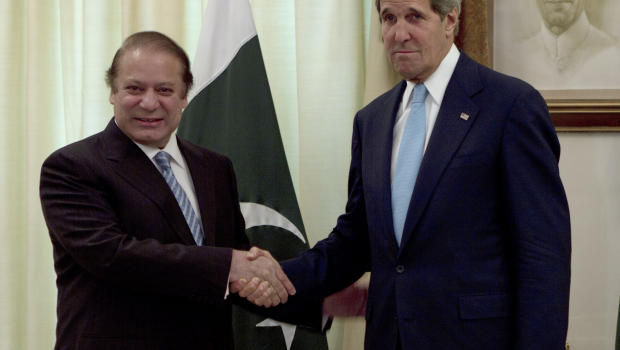
The US delegation led by Secretary of State John Kerry arrived at the Pakistan Foreign Office to hold dialogue with Pakistani delegation led by Sartaj Aziz and later with Prime Minister Mian Nawaz Sharif on Thursday morning.
Kerry came to press the new government on eliminating militant safe-havens, as US-led troops prepare to leave Afghanistan, along with addressing the issue of US drones strikes against suspected militants in the restive Waziristan areas of Pakistan.
Islamabad demands an end to US drone attacks targeting Al-Qaeda and Taliban operatives and bristles over US insistence to ‘do more’ to eradicate the threat posed by militants.
Kerry also held talks with Prime Minister Nawaz Sharif, who won a convincing victory in the May elections. PM Nawaz described Kerry as a “wonderful friend”.
“Now that you are leaving Afghanistan, let’s prepare the foundations of a new relationship that goes beyond Afghanistan,” Sartaj Aziz, Mr. Sharif’s adviser on foreign affairs and Pakistan’s de facto foreign minister, said in a recent interview.
Meanwhile Nawaz Sharif sent his special envoy, the experienced Shaharyar M. Khan to meet the Indian Prime Minister Manmohan Singh. Nawaz Sharif`s sincere desire to move forward on improving relations with India were warmly reciprocated by Manmohan Singh.
With trade as the driving factor between the India-Pakistan peace-process, which had stalled after the 2008 Mumbai terror attacks, there appears to be no reason for the talks to fail. The dialogue has already yielded a liberalized visa policy and increased trade between the neighbors. Shortly after Sharif’s victory in the elections, Dr Singh had personally congratulated him.
As Secretary of State John Kerry flew into Pakistan, American officials said the US was very supportive of recent moves by India and Pakistan to normalize relations, but there was no change in its hands off Kashmir policy.
The official said “the great strides in normalization on the economic side have been very important the last few years and have really paved the way for better and more constructive conversations on the political side.”
“So we’ll see where that continues to lead,” he said recalling that during his India visit last month, Kerry had “called on the Indians to continue that process of facilitation, as well as the Pakistanis to do things like provide MFN (Most favored nation) status to the Indians.”
“And I’m sure that that will be part of the conversations that we continue to have,” the official from US said. “But we are external actors in this. We are in no way seeking to broker any sort of conversation on Kashmir.”
In meetings with Sharif, Army Chief General Ashfaq Kayani and outgoing president Asif Ali Zardari, Kerry is expected to press the new government on eliminating militant safe-havens as US-led troops prepare to leave Afghanistan next year.
Asked about Pakistan’s refusal to give up their use of proxies through certain domestic terrorist groups in the Indo-Pak context, the official said this would be a part of the conversation with the Pakistanis.
“To paraphrase Margaret Thatcher on Mikhail Gorbachev, he [Mr. Sharif] is someone the US can do business with, but won’t always agree with,” said Karl Inderfurth, who was assistant secretary of state for South Asian affairs during Mr. Sharif’s 1998 visit to Washington.”
Following the events Pentagon released a report in which General Dunford said that by the end of next year, “the actual fighting on a day-to-day basis will all be done by Afghans.” But he also cautioned that “Afghan forces, at the end of 2014, won’t be completely independent,” and said that “our presence post-2014 is necessary for the gains we have made to date to be sustainable.”
Meanwhile another abrupt change made its way: ‘Following reports in recent weeks that the White House is considering a full withdrawal from Afghanistan when the NATO-led mission ends in December 2014, a Pentagon assessment released Tuesday says significant foreign military assistance and financial support for Afghan security forces will be required long after United States troops are expected to depart.’
Nawaz Sharif seems to be proving as the silver lining for involved nations in the 2014 scenario, especially for America. In the present context, Nawaz Sharif is not in any way acting upon the national interest of Pakistan. He seems to have liberalized Pakistan’s relation which goes without any benefit to the people of Pakistan or the nation itself. There were no crystal clear statements given by both sides, except reports, with regards to resurrection of strategic talks and relations between two states. The drawdown is also vague; the vacuum of Afghanistan after allied forces will leave the area has also not come under discussion yet. The Indian factor and its presence in Afghanistan is also a big question mark which perhaps our policy makers could not highlight in these meetings effectively. Even though, a relationship at the move on is a good sign, only this time, Pakistan may have to be careful, while shaking hands with a nation having a history of deceits.









Relations with a ” nation having a history of deceit”….was the author talking about Pakistan or the USA?….have you forgotten about Abbotabad?…does anyone believe that Pakistan did not know anything about where Osama was hiding?….and I suppose no one knows where al zahwari is hiding in Pakistan either?…The USA has given Pakistan a lot more friendship than it has ever received in return…